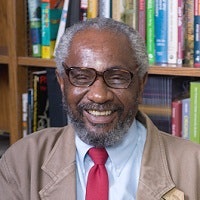Although Dr. Ronald Walters died in 2010, his life as a civil rights activist and prolific scholar continues to be the subject of discourse and analysis.
This week, colleagues and friends who knew Walters discussed his legacy in connection with the recent publication of Ronald W. Walters and the Fight for Black Power, 1969-2010 by Dr. Robert C. Smith.
Several events hosted by Howard University and the National Newspaper Publishers Association (NNPA) focused attention on Smith’s “political biography” of the man who advised and supported Black leaders while becoming one of the nation’s leading Black studies academicians. The book traces the Black political movement through Walters’ life in that struggle.
 Dr. Robert C. Smith, author
Dr. Robert C. Smith, authorAlthough he is often associated with Howard because of his tenure there from 1971 to 1996 as a professor in the political science department and chair for nine of those years, Walters later served as director of the African American Leadership Institute at the University of Maryland for 13 years. He also taught at Syracuse University, Princeton, Brandeis and was a fellow in the Institute of Politics at Harvard’s Kennedy School of Government.
But academia was just a slice of Walters’ robust life. A forum held last Tuesday focused on his work as a strategist, activist and guiding force supporting political figures and civil rights leaders.
Speakers included Smith, the author and professor of political science at San Francisco State University; former Democratic Party chair and Georgetown University adjunct professor Donna Brazile; Sirius XM radio host Joe Madison; Morgan State University professor Dr. Raymond Winbush and NNPA publisher Dr. Benjamin Chavis.
Explaining that he wrote the book because Walters’ legacy “needed to be preserved,” Smith pointed out that, despite all of Walters’ activities, “The last decade of his life was devoted to reparations.”
 Dr. Ronald Walters
Dr. Ronald WaltersWinbush agreed, based on his experiences with Walters.
“We rarely have Black nationalists who will comment publicly and go on national television and talk about reparations,” Winbush said. “But Ron didn’t quibble at all about [speaking on] the issue of Black Power or about the issue of reparations.”
Brazile, author of the controversial book Hacks about her experiences during the 2016 presidential campaign, recalled that Walters “nurtured, encouraged and inspired” her in her early career. She described her work with Walters in the 1984 Jesse Jackson presidential campaign.
“Ron wanted us to disrupt the Democratic Party. Ron gave Rev. Jackson a framework in which we had to disrupt — yes disrupt — the Democratic Party. . . We changed the rules because Ron understood that if we could not change the rules we could not impact the party. He said if we’re going to vote for the Democratic Party, we have to disrupt it,” Brazile said.
“They wanted our votes but not our voices,” she continued. “He reminded us that we deserved to have seats at the table.”
By 1988, she said, “Ron had helped reshape the Democratic Party, its policies and its rules.” In addition to his role in the Jackson campaign, Walters served as advisor to the founding members of the Congressional Black Caucus.
In recalling his interactions with Walters, Madison commented on his “seriousness” about the movement.
“He would test you, and if he found that you weren’t serious, he didn’t have time for you,” Madison remarked.
A native of Witchita, Kansas, Walters led lunch counter sit-ins there as a teenager. He attended Fisk University and earned his master’s and doctoral degrees at American University.
Smith’s book is just the latest work about Walters’ life. In 2014, Smith co-edited with Cedric Johnson and Robert G. Newby a collection of articles by leading scholars on the subject of Walters’ work and related topics, titled What Has This Got to Do with the Liberation of Black People? The Impact of Ronald W. Walters on African American Thought and Leadership.
Walters, himself, published numerous books, including his award-winning Black Presidential Politics in America: A Strategic Approach (1987); White Nationalism: Black Interests (2003); Freedom is Not Enough: Black Voters, Black Candidates, and American Presidential Politics (2005) and more than 200 articles. He also was a syndicated columnist in the Black press and a frequent commentator in broadcast media.
Two years after his death, Howard established the Ronald W. Walters Leadership and Public Policy Center.
Madison summed up Walters’ contributions by quoting a passage from Smith’s book that described Walters as “having a rare ability to combine scholarship with activism.”
Madison added: “That’s what we’re missing today.”


















